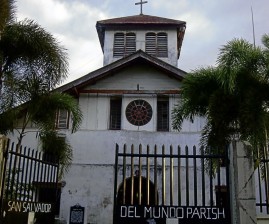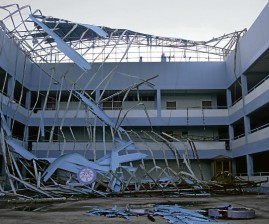
STILL STANDING Most residents of Caraga town in Davao Oriental call it a miracle after the 128-year-old church of San Salvador del Mundo withstood the rampage of Typhoon “Pablo.” NICO ALCONABA/INQUIRER MINDANAO
CARAGA, Davao Oriental—For 128 years, the stone and wooden church of San Salvador del Mundo near a promontory facing the Pacific Ocean has stood as a sentinel against intruders from the sea and a beacon of hope.
The old mission station built by Recollect priests during the 19th century held its ground against Typhoon “Pablo,” surprising residents.
Buildings around it crumbled in the face of monster winds gusting up to 200 kilometers per hour as the howler swept across Mindanao on Dec. 4 last year, flattening communities and plantations and leaving over 1,000 dead, 800 missing and tens of thousands homeless.
“Most people consider it a miracle,” said Caraga parish priest Uldarico Turoba.
“The church is very close to the shore; it is located along the coast but except for some of its GI (galvanized iron) sheets that were blown off, it practically survived almost unscathed the strongest storm to visit Mindanao,” Turoba said, glancing at the wrecked dome of the St. Mary’s College building across the street.
Regarded as the oldest surviving stone church in Mindanao, the edifice was built in 1884. It used to serve as Spain’s first mission station in Mindanao.
Nat’l historical site
The National Historical Commission of the Philippines declared the church a national historical site on July 16 last year, Caraga town’s fiesta, giving it the iconic stature of such recently recognized landmarks as Camp Crame in Quezon City, the Schoolhouse of the Women of Malolos and the Gomburza execution site, among many others.
Ludovico Badoy, the commission’s executive director, has said that the church is significant not only for Davao Oriental but also for the whole country because this is where “Christianity began” in this part of the Philippines.”
The insignia on its main door bears the symbol of Christ and dates back to the church’s foundation.
From where it stood a few paces away from the promontory, the church, as the townspeople like to believe, strategically guarded the town against intruders.
Among the old artifacts that the church still holds are a church bell dating back to 1802, two gigantic seashells more than a hundred years old serving as holy water font for churchgoers, an antique baptismal basin near the entrance and an ancient statue of San Isidro Labrador.

TOPLESS In front of the old stone and wooden church is the St. Mary’s College building, which lost its dome as the typhoon blew into town. NICO ALCONABA/INQUIRER MINDANAO
Minor damage
But Turoba said the church was not totally spared from the typhoon. He admitted having soldered back at least 38 pieces of GI sheets to its roofing after they were damaged by the wind.
“But unlike its surrounding structures, the Caraga church underwent only a minor damage,” he said, noting that the old GI sheets used by the church were sturdier compared to those in the market now, which could have explained the relatively minor damage to its roofing.
“This can only mean that our church is strong, it has been with us for a long time, it had withstood the test of time; now it has survived the strongest typhoon to have hit Mindanao,” Turoba said.
“I can’t even say the typhoon’s effect was minimal because in some areas, coconut trees were uprooted, the roofs of houses were ripped off,” he said.
He said that like everything else, the recent typhoon brought an important message to the people. “And the message is that we should take care of the environment and that we should strengthen our faith, just as the church of Caraga has withstood the test of time.”
Originally posted: 9:49 pm | Sunday, January 6th, 2013

